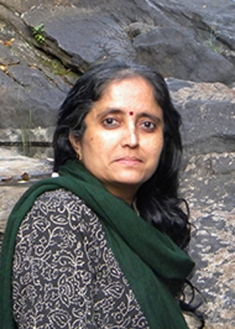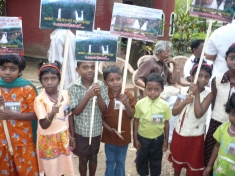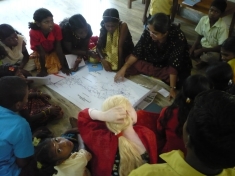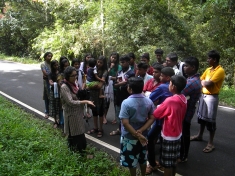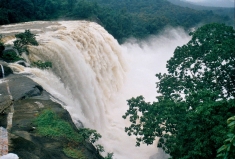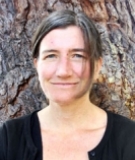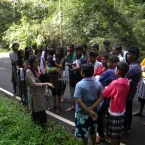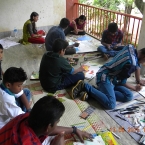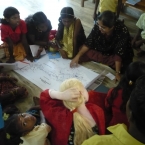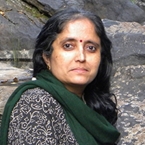Nature Gives Us Hope: River Guardian Latha Anantha
To celebrate our 30th anniversary, we’re devoting a new series to the people who have shaped, and are still shaping, river movements around the world. This month, we profile Indian river expert Dr. Latha Anantha.
The first question I asked Dr. Latha Anantha was this: “Do you ever sleep?”
She laughed. In fact, she laughed for such a long time that I realized I’d hit a nerve.
It was a fair question. Looking at her list of accomplishments and the number of campaigns she’s been involved with over the years, you could be forgiven for thinking she’d cloned herself to do it all.
A Life Devoted to Rivers
First and foremost, she’s the founder, director and managing trustee of the River Research Centre (RRC) in Kerala, South India. To call RRC a “powerhouse” would be an understatement: RRC does innovative work on river basins – everything from mapping, research and advocacy to watershed restoration – while also conducting a hugely successful School for Rivers that helps local children develop a relationship with their environment.
Anantha has the ear of decision-makers in government, and she’s an internationally-recognized expert in e-flows – the difficult science of figuring out how much water a river needs, and when, to both meet human demands and perform its key ecological functions. Government officials seek her opinions and testimony on myriad projects – perhaps most notably on the Western Ghats, Kerala’s ancient mountain range and a biodiversity hotspot she’s fought for years to protect with Save the Western Ghats.
A prolific author and sought-after speaker, Anantha is also incredibly persuasive. Our South Asia Program Director Samir Mehta told me that Dr. Anantha was possibly the only person in India who’d ever successfully convinced dam operators to manage a reservoir differently for the health of the river downstream.
The list of Anantha’s accomplishments goes on and on – she’s a National Steering Committee Member of the Forum for Policy Dialogue on Water Conflicts in India, and in 2012, she was awarded the prestigious Ashoka Fellowship.
You get the idea. Latha Anantha is a busy woman.
A Cancer Diagnosis
But after laughing at my question about sleep, Dr. Anantha turns serious. “That’s a good question – you actually hit the nail on the head. In fact, I used to sleep very little. I used to, but not now.....You must know that I went through a very bad phase last year.”
She was referring to a cancer diagnosis that stopped her in her tracks in 2014. She underwent grueling treatment for the disease, and had to stop work entirely for a while. “Before that I used to rarely sleep,” Anantha says. “I led a very fast-track life, but after that I’ve slowed down deliberately. I’m back, but not like old times.”
It was the children, in part, who brought her back, she says.
Because it turns out that, despite her high-powered resume, Dr. Anantha is a rare, almost unheard-of species: a policy wonk who also gets her hands dirty working with kids.
I asked her why, when she is so heavily involved with high-level policy discussions, research and analysis, she still conducts grassroots education with children – and does it herself.
“I’ve been involved in nature education for 25 years,” she says. “I focus on children because I believe that they are the change-makers for the future.”
The problem is, Anantha says, is that people don’t have a sense of belonging to a place anymore. “We have a sense of alienation from nature. That’s why I’ve been interacting with students for 25 years. It’s very important that we instill that sense of connection to nature at a young age.”
Our Increasing Alienation From Nature
Anantha has seen the effects of this alienation from nature since her earliest professional days, when she was an agricultural officer for the state of Kerala and saw farmers abandoning traditional farming practices to pursue the monocrops subsidized by the state.
“Traditional homestead systems were so rich in biodiversity and local food security. They produced lots of medicines and vegetables – everything was food, fodder, timber, or something that was part of your living. That was replaced completely by commercial agriculture.”
Suddenly farmers who’d lived off of the land were growing only rubber and using pesticides and fertilizer for the first time. Streams were becoming polluted and drying up, and farmers who had once supplied all their own needs had to buy pesticide-laden produce trucked in from elsewhere to feed their families.
It was, she says, the start of a long process of people growing alienated from the land and the natural systems that support life. Her job, she says, is to reverse that process with children.
And her efforts are bearing fruit. “Many of those students from 25 years ago are coming back and working with us, or volunteering in college and doing environmental work.”
But, she says, “I’m not looking at the numbers. Of 100 children, if there are five who are saying they’ll carry it forward, that’s a success. It’s always the minority that makes the changes, not the majority. Many of these children tell us that even if they go to a professional course, they are going to devote something of their lifetime to rivers and forests.” And that is success.
Youth Inspire Her Work
But what does she get from working with kids?
She pauses for a minute, considering, and then says, “Kids are capable of thinking beyond politics. They can see things very clearly. We adults get cemented, we are influenced and politicized, but kids are very clear in their thoughts. They have a lot more clarity than us. We feel that interacting with kids is a mutual learning process.”
“At 50 years old, to look at things from a kid’s point of view – that requires a lot of rethinking, refreshing the brain, refreshing the soul. You feel very pure once you are with the children, like the river.”
“We may have negative thoughts, but with kids, all your negative thoughts vanish. It helps to keep you positive. Last year when I was battling with cancer, I kept thinking I needed to come back to them, and I needed to be able to talk more about rivers.”
Anantha finds that just being with the children keeps her youthful. “When I’m talking to kids, I don’t feel I’m fifty. I feel 20 years younger. There’s a lot of effort needed, you have to change your language, you have to think simpler. But I’m also getting nurtured.”
In May of this year, the RRC organized a summer camp for kids called “Draw and Write My River.” They took for children for nature walks to the local forest and river.
For some, it was the first time they’d really seen and experienced the natural world around them. “We showed them the forest, the sound of birds, the sound of flowing water. They bathed in the river, swam in the river.”
“After that, their mind changes,” says Anantha. She’s noticed children’s attention spans have grown shorter in the past 25 years, but after a day in the river, something shifts. The children came back and drew pictures and wrote poems about their experiences, and even wrote and performed a skit about the river.
Reconnecting to Rivers and the Natural World
Anantha feels that people of all ages need a relationship with nature to feel whole again. “After I went through this horrible phase in my life, and I’ve come back out of it, I came to feel that more and more of us should be going back to our roots.
“Nature has always been a source of energy for human beings. Wealth comes and goes, luxury comes and goes. But what keeps us going is something that nature tells us. That’s something which each of us has inside us.
"Nature gives us hope.”
Anantha says a lot of people ask her what keeps her going. Aside from her work with children, she fights what sometimes seem like a never-ending battle against zombie projects that threaten rivers and forests year after year. She’s fought some projects – like a dam project proposed for Kerala’s Chalakudy River, for example – for 25 years.
“After I went through this treatment last year, I didn’t imagine I’d again have the energy to fight this project for a fourth time,” she says. But after she returned to work, she found the energy returned too – flowing as steadily and surely as the rivers she fights to save.
“What drives me is not the politics, or the thrill of taking leadership in something. What drives me is that the river has to flow. A flowing river, for me, is a source of energy, spirit and inspiration to go on.
“It’s the river that drives me. Nothing else.”
In her 2012 report on e-flows, Anantha writes:
Our rivers are inching towards ecological and hydrological death.
Before it is too late, we need to get our act together...to save our lifelines
To put it very simply, rivers need their flow back...
In India, almost nobody has done more than Dr. Latha Anantha to help rivers get their flow back. That’s why we’re thrilled to name her our August River Guardian.

